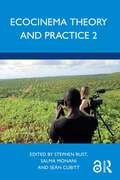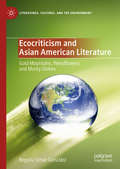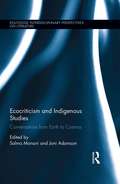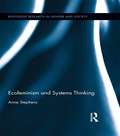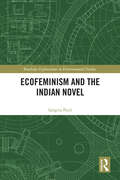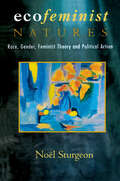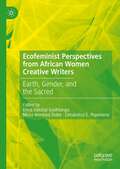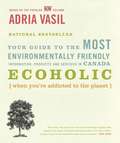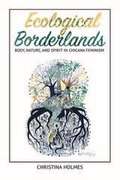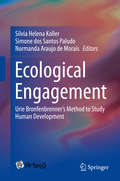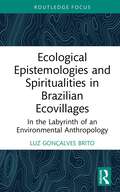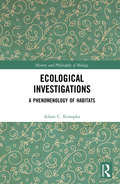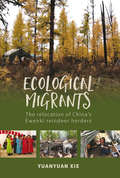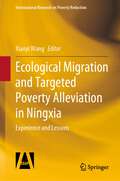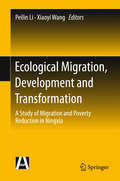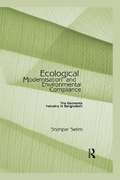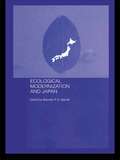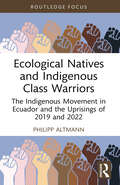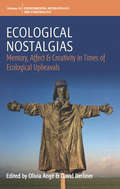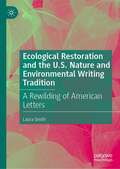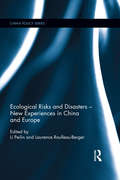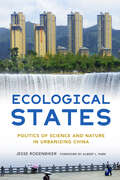- Table View
- List View
Ecocinema Theory and Practice 2
by Stephen Rust Monani Salma Cubitt SeánThis second volume builds on the initial groundwork laid by Ecocinema Theory and Practice by examining the ways in which ecocritical cinema studies have matured and proliferated over the last decade, opening whole new areas of study and research. Featuring fourteen new essays organized into three sections around the themes of cinematic materialities, discourses, and communities, the volume explores a variety of topics within ecocinema studies from examining specific national and indigenous film contexts to discussing ecojustice, environmental production studies, film festivals, and political ecology. The breadth of the contributions exemplifies how ecocinema scholars worldwide have sought to overcome the historical legacy of binary thinking and intellectual norms and are working to champion new ecocritical, intersectional, decolonial, queer, feminist, Indigenous, vitalist, and other emergent theories and cinematic practices. The collection also demonstrates the unique ways that cinema studies scholarship is actively addressing environmental injustice and the climate crisis. This book is an invaluable resource for students and scholars of ecocritical film and media studies, production studies, cultural studies, and environmental studies.
Ecocriticism and Asian American Literature: Gold Mountains, Weedflowers and Murky Globes (Literatures, Cultures, and the Environment)
by Begoña Simal-GonzálezEcocriticism and Asian American Literature: Gold Mountains, Weedflowers, and Murky Globes offers an ecocritical reinterpretation of Asian American literature. The book considers more than a century of Asian American writing, from Eaton’s Mrs. Spring Fragrance (1912) to Ozeki's A Tale for the Time Being (2013), through an ecocritical lens. The volume explores the most relevant landmarks in Asian American literature: the first-contact narratives written by Bulosan, Kingston, Mukherjee, and Jen; the controversial texts published by Sui Sin Far (Edith Eaton) at the time of the Yellow Peril; the rise of cultural nationalism in the 1970s and 1980s, illustrated by Wong’s Homebase and Kingston’s China Men; old and recent examples of “internment literature” dealing with the incarceration of Japanese Americans during WWII (Sone, Houston, Miyake, Kadohata); and the new trends in Asian American literature since the 1990s, exemplified by Yamashita’s and Ozeki’s novels, which explore the challenges of our transnational, transnatural era. Begoña Simal-González’s ecocritical readings of these texts provide crucial interdisciplinary insights, addressing and analyzing important narratives within Asian American culture and literature.
Ecocriticism and Indigenous Studies: Conversations from Earth to Cosmos (Routledge Interdisciplinary Perspectives on Literature)
by Joni Adamson Salma MonaniThis book addresses the intersections between the interdisciplinary realms of Ecocriticism and Indigenous and Native American Studies, and between academic theory and pragmatic eco-activism conducted by multiethnic and indigenous communities. It illuminates the multi-layered, polyvocal ways in which artistic expressions render ecological connections, drawing on scholars working in collaboration with Indigenous artists from all walks of life, including film, literature, performance, and other forms of multimedia to expand existing conversations. Both local and global in its focus, the volume includes essays from multiethnic and Indigenous communities across the world, visiting topics such as Navajo opera, Sami film production history, south Indian tribal documentary, Maori art installations, Native American and First Nations science-fiction literature and film, Amazonian poetry, and many others. Highlighting trans-Indigenous sensibilities that speak to worldwide crises of environmental politics and action against marginalization, the collection alerts readers to movements of community resilience and resistance, cosmological thinking about inter- and intra-generational multi-species relations, and understandings of indigenous aesthetics and material ecologies. It engages with emerging environmental concepts such as multispecies ethnography, cosmopolitics, and trans-indigeneity, as well as with new areas of ecocritical research such as material ecocriticism, biosemiotics, and media studies. In its breadth and scope, this book promises new directions for ecocritical thought and environmental humanities practice, providing thought-provoking insight into what it means to be human in a locally situated, globally networked, and cosmologically complex world.
Ecofeminism and Systems Thinking (Routledge Research in Gender and Society #36)
by Anne StephensThis book brings together two vitally important strands of 20th-century thinking to establish a set of simple and elegant principles for planning, project design and evaluation. It explains the backgrounds of cultural ecofeminism and critical systems thinking, and what we find when they are systematically compared. Both theories share a range of concepts, have a strong social justice ethic, and challenge the legacy of modernity. The book takes theory into practice. The value of the emergent principles of feminist-systems thinking are described and demonstrated through four chapters of case studies in community development settings. The principles can be used to influence project design and outcomes across a range of disciplines including project management, policy, health, education, and community development. This book has much to offer practitioners who seek to create more socially just and equitable project and research outcomes.
Ecofeminism and the Indian Novel (Routledge Explorations in Environmental Studies)
by Sangita PatilEcofeminism and the Indian Novel tests the theories of ecofeminism against the background of India’s often different perceptions of environmental problems, challenging the hegemony of Western culture in thinking about human problems. This book moves beyond a simple application of the concepts of ecofeminism, instead explaining the uniqueness of Indian novels as narratives of ecofeminism and how they can contribute to the development of the theory of ecofeminism. In examining a selection of novels, the author argues that Indian texts conceptualize the ecological crisis more as a human problem than as a gender problem. The book proposes that we should think of ecofeminism as ecohumanism instead, seeing human beings and nature as a part of a complex web. Novels analysed within the text include Kamala Markandaya’s Nectar in a Sieve (1954), Shivram Karanth’s Return to Earth (2002) and Na D’Souza’s Dweepa (2013). Ecofeminism and the Indian Novel will be of great interest to students and scholars of ecofeminism, ecocriticism, ecological feminism, environmental humanities, gender studies, ecological humanities, feminist studies and Indian literature.
Ecofeminist Approaches to Early Modernity
by Jennifer Munroe Rebecca LarocheChallenges the notion of how early modern women may or may not have spoken for (or even with) nature. By focusing on various forms of 'dialogue,' these essays shift our interest away from speaking and toward listening, to illuminate ways that early modern Englishwomen interacted with their natural surroundings.
Ecofeminist Natures: Race, Gender, Feminist Theory and Political Action
by Noel SturgeonExamining the development of ecofeminism from the 1980s antimilitarist movement to an internationalist ecofeminism in the 1990s, Sturgeon explores the ecofeminist notions of gender, race, and nature. She moves from detailed historical investigations of important manifestations of US ecofeminism to a broad analysis of international environmental politics.
Ecofeminist Perspectives from African Women Creative Writers: Earth, Gender, and the Sacred
by Enna Sukutai Gudhlanga Musa Wenkosi Dube Limakatso E. PepeneneThis volume explores contemporary African women’s creative writing, highlighting their contributions to ecofeminist theology. Contributors address the following questions: How do contemporary African women writers depict the Earth/land/environment and its relationship to women in various contexts? How is religion featured in African women’s writing? How does religious literature (scriptures) form an intertextual layer in African women’s writing? The contributors proceed by analyzing the intersection of religion, gender, class, sexuality, colonialism, and ecology in selected texts written by African women. They bring these texts into conversation with broader eco-feminist theological scholarship, exploring the potential of literary writing to contribute to theological discourse of liberation and social justice in the African and global arena.
Ecogames: Playful Perspectives on the Climate Crisis (Green Media)
by Stefan Werning Gerald Farca Joost Raessens Beke, Laura op deWith the climate crisis and its repercussions becoming more and more tangible, games are increasingly participating in the production, circulation, and interrogation of environmental assumptions, using both explicit and implicit ways of framing the crisis. Whether they are providing new spaces to imagine and practice alternative forms of living, or reproducing ecomodernist fantasies, games as well as player cultures are increasingly tuned in to the most pressing environmental concerns. This book brings together chapters by a diverse group of established and emerging authors to develop a growing body of scholarship that explores the shape, impact, and cultural context of ecogames. The book comprises four thematic sections, Today's Challenges: Games for Change, Future Worlds: New Imaginaries, The Nonhuman Turn, and Critical Metagaming Practices. Each section explores different aspects of ecocritical engagement in and through games. As a result, the book's comprehensive scope covers a variety of angles, methodologies, and case studies, significantly expanding the field of green media studies.
Ecoholic: Your Guide to the Most Environmentally Friendly Information, Products and Services in Canada
by Adria VasilWhen the world’s environmental woes get you down, turn toEcoholic– Canada’s best resource for practical tips and products that help you do your part for the earth. You’ll get the dirt on what not to buy and why, and the dish on great gifts, clothes, home supplies and more. Based on the popular and authoritative "Ecoholic" column that appears weekly inNOW,Ecoholicis a cheeky and eye-opening guide to all of life’s greenest predicaments. The Best Green Products For the home: cleaning and laundry supplies, furniture, linens For renovations: flooring, paint, insulation, carpets, cabinetry For the kitchen: cookware, appliances For your body: cool clothes, jewellery, shoes, beauty care For baby: toys, cribs, organic food, diapers For the garden: fertilizer, pest control, patio furniture For the office: supplies, equipment, energy savings For your pet: natural food, flea control, litter solutions For the fun of it: sporting goods, camping equipment, holidays The Most Current Information Avoiding toxins in the home Buying pesticide-free food Sustainable seafood, meat and veggie choices Reducing energy and water use Greening your love life Eco-tourism Keeping your home and garden pest-free without harmful chemicals Green gift-giving and ethical investing Choosing an environmentally friendly career The big issues facing Canada and how to get involved The Most Helpful Services Electronics and computer recyclers Alternative energy suppliers Green general stores Local organic food delivery Incentives and rebates for greening your home Local and national environmental groups Household hazardous waste disposal Also includes a city-by-city guide: Calgary, Halifax, Montreal, Ottawa, Toronto, Vancouver, Winnipeg
Ecological Borderlands: Body, Nature, and Spirit in Chicana Feminism
by Christina HolmesEnvironmental practices among Mexican American woman have spurred a reconsideration of ecofeminism among Chicana feminists. Christina Holmes examines ecological themes across the arts, Chicana activism, and direct action groups to reveal how Chicanas can craft alternative models for ecofeminist processes. Holmes revisits key debates to analyze issues surrounding embodiment, women's connections to nature, and spirituality's role in ecofeminist philosophy and practice. By doing so, she challenges Chicanas to escape the narrow frameworks of the past in favor of an inclusive model of environmental feminism that alleviates Western biases. Holmes uses readings of theory, elaborations of ecological narratives in Chicana cultural productions, histories of human and environmental rights struggles in the Southwest, and a description of an activist exemplar to underscore the importance of living with decolonializing feminist commitment in body, nature, and spirit.
Ecological Engagement: Urie Bronfenbrenner’s Method to Study Human Development
by Silvia Helena Koller Simone dos Santos Paludo Normanda Araujo de MoraisThis book presents the method developed by Dr. Silvia Helena Koller and her students and collaborators to apply Urie Bronfenbrenner’s Bioecological Theory of Human Development to empirical studies with children and adolescents. Although Bronfenbrenner's theory, in different stages of development, has been widely cited by several researchers, surprisingly little has been written about the theory itself, its evolution or about the methods that should be used to test it. This book fills this gap by presenting both an overview of Bronfenbrenner’s theory and a method to apply it to empirical research, the Ecological Engagement method.The book also shows how this method can be applied in practice by bringing together a series of research reports of studies carried out in different regions of Brazil and in Angola that used the Ecological Engagement method to study children and adolescent development in different contexts, such as street situation, sexual exploitation, institutional reception, family reintegration, school and emergency and disasters, among others.Ecological Engagement – Urie Bronfenbrenner’s Method to Study Human Development will be a valuable tool for psychologists and other social scientists interested in child and adolescent development looking for a solid an innovative methodology that allows researchers to directly interact with their research subjects in their own social contexts in order to fully understand their problems and issues. “The methodology of Ecological Engagement, that is explained and richly empirically illustrated in this book, is a singularly significant extension of [Urie Bronfenbrenner’s] bioecological model. Indeed, in my view it is a brilliant empirical instantiation of the PPCT component of the model. (…) Ecological Engagement methodology is the scientific means through which Urie’s legacy can be furthered.” – Excerpt from the Foreword to the International Edition by Dr. Richard M. Lerner, director of the Institute for Applied Research in Youth Development, Tufts University
Ecological Epistemologies and Spiritualities in Brazilian Ecovillages: In the Labyrinth of an Environmental Anthropology (Routledge Environmental Anthropology)
by Luz Gonçalves BritoThis book brings together ethnographic field research on four permacultural ecovillages in Brazil to highlight the importance of spirituality and ecological epistemologies as key analytical tools. It demonstrates that ecological spirituality can, and should, be understood beyond the dichotomy of personal and political, between people and nature, in the field of environmental anthropology. The book uses a broad philosophical methodology based on the phenomenological theories of Maurice Merleau-Ponty, Tim Ingold and Alfred Schutz combined with post-structuralist conceptions of the relationship between person and world, individual and society. The field research consisted of ethnographic travel, observation and recorded dialogue with individuals based in each ecovillage: Arca Verde, situated in Campos de Cima da Serra; Vrinda Bhumi, a Vaishnava ecovillage in Baependi-MG; Goura Vrindavana, a Vaishnava ecovillage in Paraty-RJ; and Muriqui Assu Ecovillage Project, a secular ecovillage in Niterói-RJ. Throughout the book ethnographic research is woven together with poetic interludes, images, personal narrative experience and phenomenological theory, bringing a new understanding and approach to environmental anthropology as a discipline. Including a Preface written by Tim Ingold, it will appeal to academics, researchers and upper-level students in phenomenology, environmental philosophy, environmental anthropology, religious studies and social sciences more broadly.
Ecological Imperialism
by Alfred W. CrosbyPeople of European descent form the bulk of the population in most of the temperate zones of the world - North America, Australia and New Zealand. The military successes of European imperialism are easy to explain; in many cases they were a matter of firearms against spears. But, as Alfred Crosby maintains in this highly original and fascinating book, the Europeans' displacement and replacement of the native peoples in the temperate zones was more a matter of biology than of military conquest. European organisms had certain decisive advantages over their New World and Australian counterparts. The spread of European disease, flora, and fauna went hand in hand with the growth of populations. Consequently, these imperialists became proprietors of the world's most important agricultural lands. Now in a new edition with a new preface, Crosby revisits his now-classic work and again evaluates the global historical importance of European ecological expansion.
Ecological Investigations: A Phenomenology of Habitats (History and Philosophy of Biology)
by Adam C. KonopkaThese investigations identify and clarify some basic assumptions and methodological principles involved in ecological explanations of plant associations. How are plants geographically distributed into characteristic groups? What are the basic conditions that organize groups of interspecific plant populations that are characteristic of particular kinds of habitats? Answers to these questions concerning the geographical distribution of plants in late 19th century European plant geography and early 20th century American plant ecology can be distinguished according to differing logical assumptions concerning the habitats of plant associations. Through an analysis of several significant case studies in the early history of plant ecology, Konopka distinguishes a logic of habitats that conceives of plant associations in an analogy to individual organisms with a logic that conceives of plant associations in a reciprocal relation to habitat physiography. He argues that a phenomenological conception of the logical attributes of habitats can philosophically complement the physiographic tradition in early plant ecology and provide an attractive alternative to standard reductionism and holism debates that persist today. This wide ranging and original analysis will be valuable for readers interested in the history and philosophy of ecology.
Ecological Migrants: The Relocation of China's Ewenki Reindeer Herders
by Yuanyuan XieReindeer-herding Ewenki hunters have lived in the forests of China’s Greater Khingan Range for over three hundred years. They have sustained their livelihoods by collecting plants and herbs, hunting animals and herding reindeer. This ethnography details changing Ewenki ways of life brought first by China’s modernization and development policies and more recently by ecological policies that aim to preserve and restore the badly damaged ecologies of western China. Xie reflects on modernization and urbanization in China through this study of ecological migration policies and their effects on relocated Aoluguya Ewenki hunters.
Ecological Migration and Targeted Poverty Alleviation in Ningxia: Experience and Lessons (International Research on Poverty Reduction)
by Xiaoyi WangThis book assesses Ecological Migration and Precision Poverty Alleviation Measures, based on research conducted in Ningxia. “Resettling residents currently living in poor areas” is an important measure for “precise poverty alleviation.” China’s central government has provided extraordinary support for these areas, so as to help with “removing poverty nests,” “changing poverty industries,” and “pulling out the roots of poverty.”This book is mainly based on research conducted in Ningxia, one of the earliest areas in China to achieve poverty alleviation and development through immigration and relocation. Since the Twelfth Five-Year Plan, Ningxia’s ecological migration has been integrated into the process of new urbanization and industrialization. Poverty alleviation and relocation not only involves regional transfer, industrial transformation, and changes in livelihood, but also the social adaptation and integration of migrant groups. In addition to examining these aspects, the book shares stories of how impoverished individuals have succeeded in changing their fates.
Ecological Migration, Development and Transformation
by Peilin Li Xiaoyi WangAfter over 30 years of reform and opening up, China's aggregate economic volume is now the second largest in the world. Over the past decade many provinces in the western region of China have implemented ecological migration projects of different scales, which have attracted considerable attention both in China and abroad. The projects indicate, first, that there is an urgent need for this type of endeavor: whether the goal is to reduce poverty or to protect the environment, we need to move the poor populations out of the ecologically fragile regions. Secondly, the projects indicate that the Chinese government is capable of meeting this need. Migration projects are complex and costly and without sufficient financial resources and systematic planning, migration may fail to reduce poverty, and could even aggravate it. The rapid economic growth in China, however, makes such migration projects viable.
Ecological Modernisation and Environmental Compliance: The Garments Industry in Bangladesh
by Shahpar SelimEconomic development that is environmentally, socially and ethically sound is at the forefront of contemporary debates all over the world. This is especially relevant to international trade where goods manufactured in least developed countries (LDCs) are being exported to developed countries (DCs) via international supply chains. This book looks at Bangladesh’s ready-made garments (RMG) industry – the seventh largest in the world — facing demands for environmental and social management according to standards set by consumers in environmentally progressive societies. Apart from these concerns not having found cultural or institutional resonance in Bangladesh, the pressures for cost reduction, on-time delivery and cheap labour in a highly competitive international market make the problem that much more complex. In this book Selim uses the analytical framework provided by the ecological modernisation theory to examine the economic, communicative and social political aspects of ethical trade, and argues that the economy-ecology relationship can indeed be a positive sum game if nation-states and economic actors change their policymaking styles and greening behaviour to take advantage of scientific evidence and green technological opportunities.
Ecological Modernisation and Japan
by Brendan F.D. BarrettIn the 1990s, Japan gradually began to turn green and started to experiment with more participatory forms of environmental governance. Ecological Modernisation and Japan explores this transformation and looks at Japan as a case for ecological modernisation while contextualising the discussion within its unique history and recent discussions about globalisation and sustainability. It makes a significant contribution to the ecological modernisation debate by unpacking the Japanese environmental experience.
Ecological Natives and Indigenous Class Warriors: The Indigenous Movement in Ecuador and the Uprisings of 2019 and 2022 (Routledge Studies in Latin American Politics)
by Philipp AltmannThe Indigenous movement in Ecuador was one of the most influential social movements in Latin America during the 1990s. It had a high mobilization capability, formed broad alliances, and had a clear discourse. However, since the early 2000s, it has been in crisis due to problems with national leadership. This only changed in October 2019 when a national uprising led to the movement’s reappearance in political attention, the reconstruction of alliances, and a renovation of its discourse. A national uprising in June 2022 further strengthened this development, producing a struggle around neoliberalism.With this book, Philipp Altmann helps readers understand the evolution of the Indigenous movement in Ecuador. In his chronological presentation, he emphasizes the position and perspectives of the activists and organizations of the Indigenous movement and delves into the movement’s history and the exploration of its crises and its uprisings.
Ecological Nostalgias: Memory, Affect and Creativity in Times of Ecological Upheavals (Environmental Anthropology and Ethnobiology #26)
by David Berliner Olivia AngéIntroducing the study of econostalgias through a variety of rich ethnographic cases, this volume argues that a strictly human centered approach does not account for contemporary longings triggered by ecosystem upheavals. In this time of climate change, this book explores how nostalgia for fading ecologies unfolds into the interstitial spaces between the biological, the political and the social, regret and hope, the past, the present and the future.
Ecological Restoration and the U.S. Nature and Environmental Writing Tradition: A Rewilding of American Letters
by Laura SmithThis book presents a critical history of the intersections between American environmental literature and ecological restoration policy and practice. Through a storying—restorying—restoring framework, this book explores how entanglements between writers and places have produced literary interventions in restoration politics. The book considers the ways literary landscapes are politicized by writers themselves, and by conservationists, activists, policymakers, and others, in defense of U.S. public lands and the idea of wilderness. The book profiles five environmental writers and examines how their writings on nature, wildness, wilderness, conservation, preservation, and restoration have variously inspired and been translated into ecological restoration programs and campaigns by environmental organizations. The featured authors are Henry David Thoreau (1817–1862) at Walden Pond, John Muir (1838–1914) in Yosemite National Park, Aldo Leopold (1887–1948) at his family’s Wisconsin sand farm, Marjory Stoneman Douglas (1890–1998) in the Everglades, and Edward Abbey (1927–1989) in Glen Canyon. This book combines environmental history, literature, biography, philosophy, and politics in a commentary on considering (and developing) environmental literature’s place in conversations on restoration ecology, ecological restoration, and rewilding.
Ecological Risks and Disasters - New Experiences in China and Europe (China Policy Series)
by Li Peilin Laurence Roulleau-BergerClimate change, and also other factors, are capable of bringing about major disasters on a scale hitherto unimaginable. Ecological and other risks, besides having scientific and technological dimensions, are also a subject of study for social scientists, concerned with how disasters and potential disasters are noticed, perceived, guarded against, managed once they have occurred, and coped with after they have happened. This book considers a range of ecological risks and disasters and how they are managed in both China and Europe. It examines how far risks and disasters are perceived and managed in different ways in Europe and China, explores how an increasing humanitarian approach to "vulnerable people" being taken up in Europe is also being adopted in China, and assesses how far the management of disasters differs from wider government management of more ordinary aspects of everyday life. The book argues that the same stresses and strains which are present in normal society are there also, in enhanced form, in disaster situations.
Ecological States: Politics of Science and Nature in Urbanizing China (The Environments of East Asia)
by Jesse RodenbikerEcological States critically examines ecological policies in the People's Republic of China to show how campaigns of scientifically based environmental protection transform nature and society. While many point to China's ecological civilization programs as a new paradigm for global environmental governance, Jesse Rodenbiker argues that ecological redlining extends the reach of the authoritarian state.Although Chinese urban sustainability initiatives have driven millions of citizens from their land and housing, Rodenbiker shows that these migrants are not passive subjects of state policy. Instead, they creatively navigate resettlement processes in pursuit of their own benefit. However, their resistance is limited by varied forms of state-backed infrastructural violence. Through extensive fieldwork with scientists, urban planners, and everyday citizens in southwestern China, Ecological States exposes the ways in which the scientific logics and practices fundamental to China's green urbanization have solidified state power and contributed to dispossession and social inequalityWith support from the Henry Luce Foundation, our goal is to produce all titles in this series both in Open Access, for reasons of global accessibility and equity, as well as in print editions.
